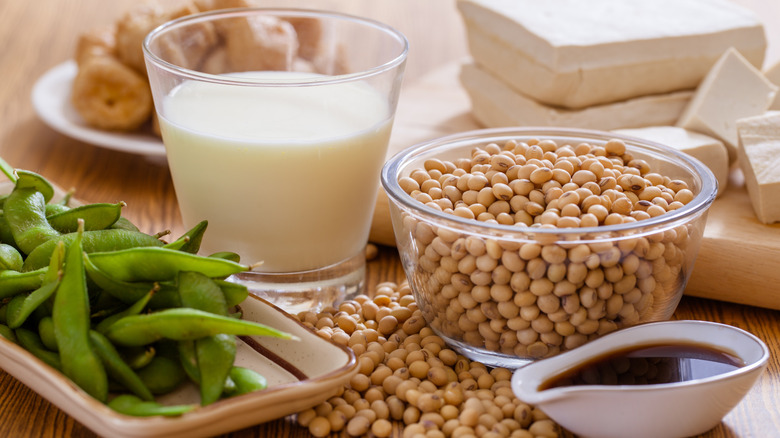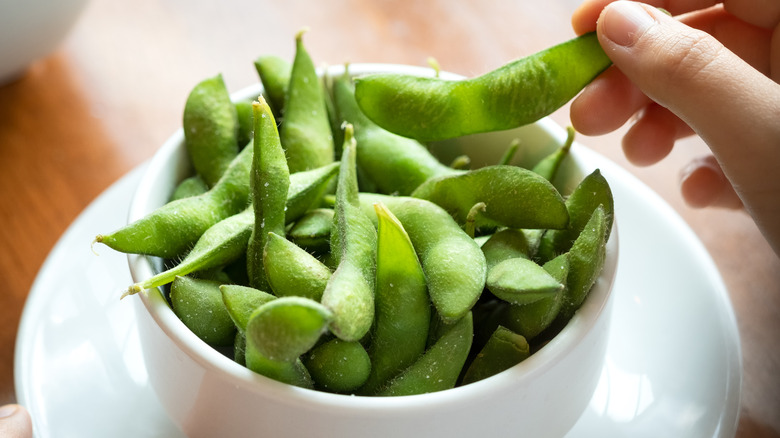An Underrated Plant-Based Protein Could Help Lower High Cholesterol (And It's Not Tofu)
When it comes to lowering cholesterol, you usually can't go wrong with a plant-based diet. Animal-based foods like meat and cheese are typically high in saturated fat and cholesterol, and too much of these foods can raise your LDL cholesterol. On the other hand, plant-based foods such as oats, nuts, beans, and fruits have fiber and other nutrients to help clear that artery-clogging LDL cholesterol from your arteries.
Meat lovers might wonder where plant-based diets get their protein. Beans, nuts, tofu, and quinoa are great plant-based protein sources, but you might not be familiar with textured vegetable protein (TVP). Even though "vegetable" is in the name, most TVPs, like Bob's Red Mill, are made with soy.
A ¼-cup serving of dry TVP has roughly the same amount of calories as ¼ cup of firm tofu. Tofu is an excellent source of calcium compared to TVP, but TVP has four times more potassium than tofu. TVP has zero saturated fat and cholesterol, and the 4 grams of fiber can help keep your cholesterol levels in check. The 12 grams of soy protein in TVP may also lower high cholesterol.
Soy protein may reduce cholesterol
People who've followed vegetarian diets are probably familiar with TVP. TVP comes in dehydrated flakes, but when you add water, it takes on a chewy texture. Like tofu, TVP takes on the taste of the flavors in your favorite recipes to substitute for ground beef in your favorite marinara sauce. Because TVP provides a good amount of soy protein without adding fat, it's a good protein source to lower cholesterol.
A 2019 meta-analysis in The Journal of Nutrition combined the results of 43 experiments involving soy protein and cholesterol. Adding 25 grams of soy protein a day to your diet can lower your LDL cholesterol by 4.76 milligrams per deciliter in six weeks. Total cholesterol could drop by 6.41 milligrams per deciliter. Although this might seem like a slight difference, the researchers said soy could substantially affect your cholesterol if you substitute soy protein for some of your animal-based protein that's high in saturated fat.
Soy protein may help cholesterol because it has a specific compound found in soybeans and other legumes. This compound may reduce the production of apolipoprotein B, a protein that can lead to an increase in LDL cholesterol.
Soy's additional health benefits
Soy got a bad reputation a few decades ago because some early research studies linked soy's isoflavones with fertility issues and breast cancer, leading to the belief that the phytoestrogens in soy affected the estrogen in the body. Later research debunked these relationships, finding that these phytoestrogens work differently. In fact, soy might reduce your risk of cancer by 10%, according to a 2022 review in Frontiers in Nutrition. For every 25 grams of soy you add to your daily menu, you could reduce your risk of cancer by 4%. Soy is particularly helpful in reducing your risk of lung and prostate cancer, lowering your risk by 33% and 12% respectively.
Soy is also good for your heart. A 2017 review in the European Journal of Preventive Cardiology found that eating soy is linked to a 16% lower risk of cardiovascular disease. However, don't rule out tofu because it can reduce your risk by 20%. Soy can also lower your risk of stroke by 18% and coronary heart disease by 17%.
Although TVP is a great way to add more soy to your diet, it's made by processing soybean oil. Most research on the health benefits of soy doesn't differentiate between minimally processed soy such as edamame and ultra-processed soy found in vegetarian meat alternatives. In other words, the research isn't clear whether TVP specifically can provide the same health benefits as less-processed soy foods.



